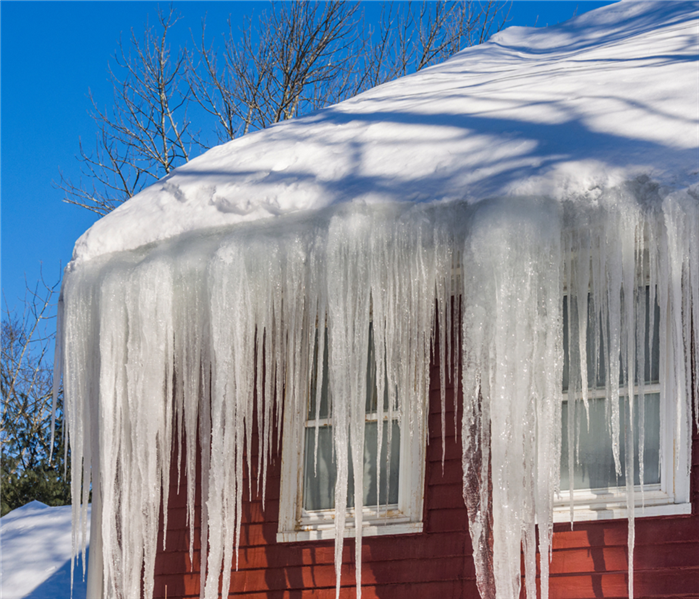Winter Causes of Water Damage and How to Prevent It
12/2/2024 (Permalink)
 Winter can bring with it more than just cold temperature, it can also lead to serious water damage in your home or business.
Winter can bring with it more than just cold temperature, it can also lead to serious water damage in your home or business.
As the winter chill sets in, we are all focused on staying warm and cozy. However, winter can bring with it more than just cold temperature, it can also lead to serious water damage in your Malvern, Pekin, Midvale, or surrounding areas home or business. Freezing pipes, heavy snowfalls, and ice dams are just a few of the common culprits that can wreak havoc on your property. The good news is, with a little proactive maintenance, you can avoid the costly and stressful consequences of winter water damage.
Here’s what you need to know about the winter causes of water damage and how to prevent them.
Frozen Pipes: A Hidden Threat
One of the most common winter water damage issues is frozen pipes. As temperatures drop, water in pipes can freeze, causing the pipes to expand. This pressure can lead to cracks or bursts in the pipe, potentially causing significant flooding when the ice thaws.
How to Prevent It:
- Insulate Pipes: Wrap your pipes, especially those in unheated areas like basements, attics, and garages, with foam insulation to help prevent freezing.
- Allow Faucets to Drip: In extremely cold weather, allow a faucet to drip slightly. The constant flow of water reduces the risk of freezing.
- Keep the Heat On: Even if you're going away for a while, leave your thermostat set to at least 55°F to keep the pipes in your home warm enough to prevent freezing.
- Seal Cracks and Gaps: Ensure there are no drafts around windows, doors, or areas where pipes are located. Seal any cracks that may allow cold air to reach your plumbing.
Ice Dams: Roof and Gutter Problems
Ice dams are formed when snow on your roof melts due to heat escaping from your attic, then refreezes along the edges of the roof. This buildup of ice can prevent water from draining off the roof, causing it to back up and leak into your attic or down into your home’s walls and ceilings.
How to Prevent It:
- Clear Gutters: Make sure your gutters are clean before winter sets in. Clogged gutters can trap water, which can freeze and contribute to ice dam formation.
- Improve Attic Insulation and Ventilation: Proper insulation and ventilation help keep the roof cold, reducing the risk of melting snow. Be sure to check that your attic is properly insulated to prevent heat loss.
- Roof Maintenance: Keep an eye on the condition of your roof, and repair any leaks or missing shingles that may allow water to penetrate.
Melting Snow and Heavy Rain: Overwhelming Drainage Systems
During winter, snow accumulates on roofs, driveways, and yards. When temperatures rise, this snow melts, and if the ground is already frozen, it may not absorb the water as efficiently. This can lead to flooding, especially around the foundation of your home.
How to Prevent It:
- Clear Snow Away from Foundations: After snowstorms, shovel snow away from the perimeter of your home to prevent melting snow from seeping into your basement or foundation.
- Check the Drainage System: Make sure your downspouts and drains are working properly. Ensure water is directed away from the foundation and not pooling around your home.
- Install Sump Pumps: If you live in an area prone to flooding, consider installing a sump pump in your basement to help divert excess water away from your home.
Condensation: A Less Obvious Culprit
Winter brings cold air inside, and with the warmth of indoor heating systems, condensation can become an issue. When warm air comes into contact with cold surfaces, it can create excess moisture, leading to potential mold growth or water damage in hidden spaces like walls or ceilings.
How to Prevent It:
- Use a Dehumidifier: Keep the humidity levels in your home balanced. If condensation is a problem, a dehumidifier can help regulate moisture levels and prevent excess water buildup.
- Increase Air Circulation: Use fans or open cabinets under sinks to allow air to circulate, preventing moisture buildup.
- Ventilate Areas Properly: Make sure that areas prone to moisture, like bathrooms and kitchens, are well-ventilated, and use exhaust fans when cooking or showering.
Damage from Ice and Snow on Structures
Heavy snow and ice accumulation on roofs, decks, and other structures can cause damage due to the weight. This can lead to water infiltration if the structure fails, or snow and ice melt and seep into cracks.
How to Prevent It:
- Remove Snow and Ice from Roofs and Decks: If safe, use a roof rake to remove excess snow from your roof. Be mindful not to damage shingles or gutters in the process.
- Inspect Roofs for Structural Integrity: Ensure your roof is in good condition before winter hits. Replace damaged shingles and check for any weak spots that could be prone to collapse under heavy snow.
Be Prepared and Stay Safe
Winter weather may be unpredictable, but with the right precautions, you can protect your home or business from water damage. By taking these steps to prevent frozen pipes, ice dams, snow accumulation, and condensation issues, you can avoid costly repairs and the stress that comes with water damage.
If you experience water damage this winter, SERVPRO of New Philadelphia is here. Our team is ready 24/7 to respond to your emergency and restore your property quickly and efficiently. Stay safe, stay warm, and remember – prevention is key!
If you need professional help with water damage restoration or emergency services, don’t hesitate to call SERVPRO of New Philadelphia.







 24/7 Emergency Service
24/7 Emergency Service